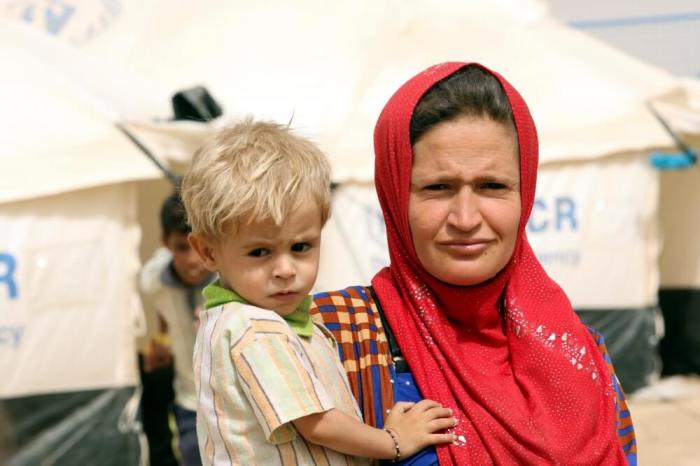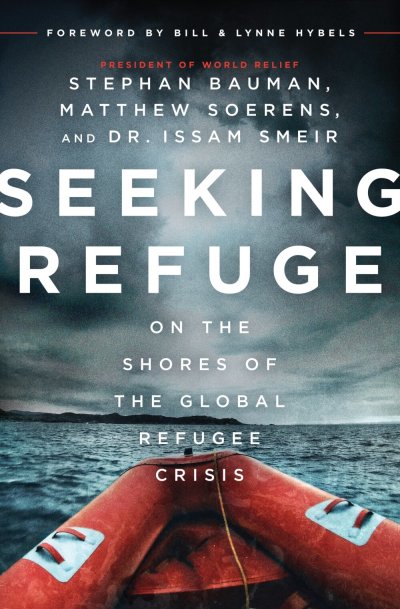Why Refugees Aren't Like Skittles

The global refugee crisis has once again dominated headlines and newsfeeds in the past few days. While world leaders gathered in New York to discuss the unprecedented scope of mass displacement, the son of a presidential candidate took to social media to compare Syrian refugees to poisoned Skittles.
This image says it all. Let's end the politically correct agenda that doesn't put America first. #trump2016pic.twitter.com/9fHwog7ssN
— Donald Trump Jr. (@DonaldJTrumpJr) September 19, 2016
While many are aware of and debating the crisis, though, far fewer are taking tangible action to help alleviate it.

For many people, the problem just seems too big. We are, after all, talking about 65 million people globally who have been forcibly displaced from their homes due to violence or persecution.
Others are disinclined to help because they fear unrest and violence here at home from refugees who resettle within our borders — especially those from the Middle East and who practice the Muslim faith.
Feeling too small and too afraid to make a difference can be paralyzing. But we don't have to feel either way when it comes to the refugee crisis. Each of us can help to contribute to the solution. And none of us need be fearful if we ground ourselves in the facts.
Here's the reality: Each day people, practicing acts of everyday compassion and kindness, can come alongside brave and resilient refugees to overcome the challenges they face when they have no choice but to flee their homelands. And history plainly shows we have very little reason to fear these determined men, women and children who are seeking to escape unfathomable distress and build peaceful, safe new lives for their families.
I know this because I've seen it firsthand in my work as U.S. director of church mobilization for World Relief, an organization that has helped resettle approximately 275,000 refugees into the U.S.
Not a single one of them — for that matter, not one of the approximately 3 million refugees legally admitted here since passage of the Refugee Act in 1980, all of whom go through an extensive vetting process that is more thorough than that which any other category of visitor or immigrant to the U.S. is subjected — has ever taken the life of an American citizen in a terrorist act.
Comparing refugees to deadly candies is wrong, first and foremost, because refugees are people, whom the Judeo-Christian faith tradition teaches are made in the image of God with inherent dignity and value. But it's also a terribly flawed analogy, because the actual risk to any American of being killed by a refugee-turned-terrorist, according to a recent analysis by the Cato Institute, are just one in 3,638,587,094.

In my new book, Seeking Refuge, co-authored by Stephan Bauman and Dr. Issam Smeir, we offer a prescription for what will get us from hostility toward refugees, to hospitality toward them, to welcoming them into our households — both literally and figuratively. For many, that road will wind through their church — after all, Jesus himself, the central figure of Christianity, was a refugee. Certainly those who call on His name and follow His example can commit to helping those like Him. That's the rallying cry of our book — exhorting the 92 percent of U.S. pastors whose congregations research indicates are not currently actively serving refugees in their communities in the ways guided by our faith.
What does that look like? First, it requires seeing the human beings behind the numbers, the men, women and children under the headlines. We must take the chance, and make the effort, to get to know the refugees in our midst — their histories, their hopes and dreams, their needs, both material and emotional, and also their remarkable potential and courage. They are not numbers; they are our neighbors.
There are many practical ways to help — both in advocating for policies that would continue to allow refugees into the country and helping them settle in, integrate, and thrive once here. Our elected officials need to be persuaded that opening our nation's arms to those fleeing persecution — done with proper due diligence — is in the best tradition of the American character. Letters to the editor of your local newspaper, writing to your elected officials, even visiting them in person to educate them on the refugee issue are all key.
And so is coming alongside those refugees who have been relocated into your city. Throughout the country, local churches and other community groups are stepping up to welcome in refugee families — helping to furnish an apartment, greeting them at the airport, helping them with English language learning, and — most importantly — offering friendship to those rebuilding their lives in a new land.
While extending hospitality in our own communities, we can also come alongside churches and other ministries who are caring sacrificially for refugees outside of the U.S. Less than one-half of one percent of refugees are resettled into our country in any given year: the vast majority remain in countries neighboring the conflict zones. By providing financial support and prayer, we can unlock hope through local churches in the Middle East, Africa, and elsewhere that are providing vital support to refugees on a scale far larger than we have the opportunity to do in the U.S.
The ways to help are as numerous as the stories of the refugees you'll be helping. Explore some of the options by visiting www.worldrelief.org/seekingrefuge.





























